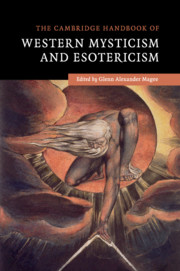Book contents
- Frontmatter
- Dedication
- Contents
- Acknowledgments
- Editor's Introduction
- List of contributors
- I ANTIQUITY
- 1 Ancient Mysteries
- 2 Pythagoras and Pythagoreanism
- 3 Parmenides and Empedocles
- 4 Plato, Plotinus, and Neoplatonism
- 5 Hermetism and Gnosticism
- 6 Early Jewish Mysticism
- 7 Early Christian Mysticism
- II THE MIDDLE AGES
- III THE RENAISSANCE AND EARLY MODERNITY
- IV THE NINETEENTH CENTURY AND BEYOND
- V COMMON THREADS
- Suggestions for Further Reading
- Index
- References
7 - Early Christian Mysticism
from I - ANTIQUITY
Published online by Cambridge University Press: 05 May 2016
- Frontmatter
- Dedication
- Contents
- Acknowledgments
- Editor's Introduction
- List of contributors
- I ANTIQUITY
- 1 Ancient Mysteries
- 2 Pythagoras and Pythagoreanism
- 3 Parmenides and Empedocles
- 4 Plato, Plotinus, and Neoplatonism
- 5 Hermetism and Gnosticism
- 6 Early Jewish Mysticism
- 7 Early Christian Mysticism
- II THE MIDDLE AGES
- III THE RENAISSANCE AND EARLY MODERNITY
- IV THE NINETEENTH CENTURY AND BEYOND
- V COMMON THREADS
- Suggestions for Further Reading
- Index
- References
Summary
Introduction
Early Christian mysticism customarily has been understood as a relatively late Platonic philosophical product of patristic theology, marked particularly by Denys the Areopagite (also known as Pseudo-Dionysius, he is thought to have written ca. 500 CE). Denys taught the apophatic way, in which the soul escapes the world to unite with the Unknowable God. The first generations of Christians and their foundational narratives are often casually brushed aside as “background” to a mysticism arising later from Christianity's fusion with Neoplatonism.
Although it is true that a particular strand of Christianity fused with Neoplatonism produced the type of mysticism taught and practiced by Denys, it is also true that long before Denys lived, there was already a rich tradition of Christian mysticism, which grew out of even older Jewish traditions. When historians of Christianity talk about mysticism, they usually define it narrowly in terms of the medieval Christian monastic tradition, in which the devotee, through spiritual practices, gradually purges darkness from the soul, experiences a spiritual death, and ascends to union with a God described as “love.” Yet comparativists, studying mysticism across religions, have a less culturally restrictive definition. For example, they define mysticism as the direct experience of Ultimate Reality. I suggest that we set aside the monastic definition of mysticism and examine, as comparativists might, those claims to direct premortem experiences of God found in the foundational Christian sources. We will find that this approach allows the texts themselves to define the phenomenon of early Christian mysticism.
Apocalyptic Experiences
To describe their immediate, premortem experiences of God, the early Christians did not use the word “mysticism,” which derives from the Greek word myeô, “to be initiated.” Although they do sometimes speak of the revelation of “mysteries” (mysteria), the first Christians call their direct immediate experiences of God “apocalypses” (apocalypseis) or “revelations.” The most famous examples are the visions of the heavenly realm and the descriptions of eschatological events given to John of Patmos. These are described as “the revelation of Jesus Christ” (Rev 1:1). The Book of Revelation mimics the form of other contemporary Jewish apocalypses, in which the otherworldly journeys of seers are described, focusing on the premortem journey or vision, and the revelation of secret knowledge of world events and cosmic endings.
- Type
- Chapter
- Information
- Publisher: Cambridge University PressPrint publication year: 2016



